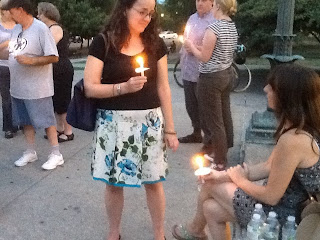The candlight service was led by Rev. Erik Christensen (St. Luke's Logan Square) and Rev. Bruce Ray (Kimball Avenue Church), using a liturgy from Holden Village. Sound was provided by the team from ALSO/New Level Sound.
Members of LSEA congregations participated, together with friends and members of the general public. Numerous people stood to share thoughts and concerns about the situation in Syria.
In addition to brief scripture passages, prayers, and songs, we read excerpts of poetry by the Syrian poet "Adonis" (Ali Ahmad Said Esber), considered by many to be the greatest living poet of the Arab world. Below is a longer excerpt of an essay, "Candlelight," by Adonis.
From CANDLELIGHT
Through the years of the civil war, especially during the siege, I learned to create an intimate relationship with darkness, and I began to live in another light that does not come from electricity, or butane, or kerosene.
I despise these last two lamps,
they spew a foul odor that kills the sense of smell and poisons the childhood of the air and the air of childhood. They repel the eyes with a beam that pierces vision like a needle.
Moreover they bring petroleum to mind and how it has transformed Arab life into a dark state of confusion and loss.
The other light I love is the light of a candle.
* * *
I chose candlelight as my companion . . .
* * *
But have we truly left the world’s darkness? I wondered as I watched the shadow the candle spread on the ground or on the wall, and the shadow my own head made. And I began to realize to my own dismay that this shadow we call delusion is not less real than myself or the candle. And I said, as I witnessed death snatch many around me with the speed of a wink, that we still stand with our backs to the sun. . . .
* * *
I was recalling [our] mythological history as I sat in candlelight and compared it with the living history we were experiencing then minute by minute, written with iron and fire, rockets and bombs, and with human limbs, by our cousins, ancestors of Moses and Solomon who are among our own prophets. Solomon, tradition says, had a way of speaking with inanimate objects and living things. And Moses was the first human to whom God had spoken, a singular honor indeed.
I was comparing this mythological, pagan history and this real Godcentric history that we live today, and so I wish to register my surprise.
There was man who never spoke to God or never even knew of him, and who had no light except candlelight. He nonetheless was able to create a history that lifts mankind and the whole world and that opened before them horizons where they could proceed endlessly.
And here was man to whom God had spoken and whom he preferred over the whole of creation, granting him electricity as if it were a dromedary crouching at his feet, and he creates his history beginning with murder then descending endlessly into an abyss of severed limbs and blood.
As I was thinking and deducing, I embraced the slim shadow of the candle and began to whisper some of my secrets to it. Then I turned toward the Mediterranean and listened to its groaning not far from our bodies, half frozen from confusion and terror, or from death that could strike us at any moment. I turned toward the sea, who invented the light of the world, and began to share in his rocky moaning rising from the ocean’s dark.
It’s the siege: A flood, but where is the ship, and where shall we go? Nothing awaits us except that mechanical specter, the F-16, that plans to turn us into a golden ash from which a murderous lot among our cousins, the offspring of Moses and Solomon, intends to use for their new crowns and thrones.
* * *
Each time the darkness pushed us into it, the candlelight held us, and returned us to its shade and to the real living moment. This is how we rose back to ourselves and their besieged light.
* * *
The faces of the people who lived in our building would throng and gather around the light of a candle, creating a panorama of wrinkles, features, countenances, blank gazes and quizzical looks:
a face of a still lake without the flutter of a single sail
a face in the shade like that of a sheep led to the slaughterhouse
a face drowned in its sorrows like a hole in the darkness
a face, a white page open to the silence
a face, a sieve through which words drop and spread in all directions
a face, a book in which you can only read forgetfulness, or more correctly, the desire to forget
a face of a woman who is a man
a face of a man who is a woman
* * *
Taking advantage of the situation he found us in, someone in our group would begin to speak of the virtues that fueled this internal light. He said these saints were inextinguishable, that they were a light that illuminated light as they have dedicated themselves to the shattering of darkness. Our companion compared this light with the loose light spewed by rockets and bombs, affirming that those who spread such a powerful light, though they speak of nothing except freedom and progress, are disseminating nothing but another name for darkness that has no place in nature, a darkness-light intended to put out all light, whatever it may be, and wherever it is found.
(Retrieved at http://www.worldrepublicofletters.com/excerpts/adonis_excerpt.pdf)
(Thanks to Robert Castillo for vigil images.)



No comments:
Post a Comment